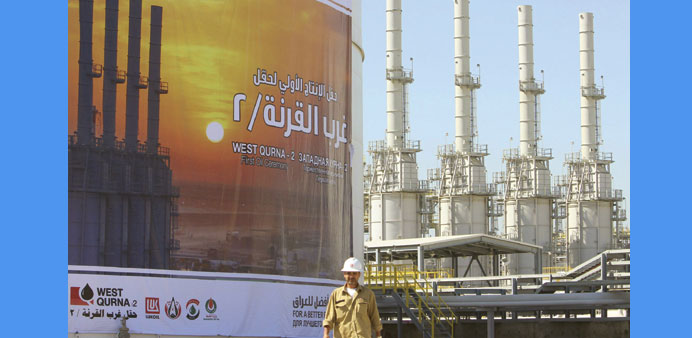The logo of Lukoil is seen in West Qurna oilfield in Iraq’s southern province of Basra. Exports from Iraq’s southern terminals averaged 2.95mn bpd over the first 17 days of this month, down from July’s record high of 3.06mn bpd.
Reuters/London
Iraq’s oil exports have fallen by at least 250,000 bpd so far in August according to loading data, making it less likely the several-month trend of rising Opec output that has weakened oil prices will be sustained this month.
Iraq has been a key driver of higher supply in 2015 from the Organisation of the Petroleum Exporting Countries, which is focusing on keeping market share rather than curbing supply to support prices.
But that growth looks to have stalled in August. Exports from Iraq’s southern terminals averaged 2.95mn bpd over the first 17 days of this month, down from July’s record high of 3.06mn bpd.
“It’s slowing down,” said an industry source who deals in Iraqi crude. “They have improved the infrastructure a lot but whether they can sustain the rate is another story.”
The southern fields produce most of Iraq’s oil. Located far from the parts of the country controlled by Islamic State militants, they have kept pumping despite the conflict.
Shipments from Iraq’s north via Ceyhan in Turkey by both the Kurdistan Regional Government and Iraq’s State Oil Marketing Organisation (SOMO) have also fallen, partly because of a bomb attack on the pipeline to Turkey.
Independent KRG exports averaged about 200,000 bpd in the first 17 days of August, according to loading data, while SOMO exported a few pipeline shipments at an average of 45,000 bpd, according to loading data and an industry source.
Taken together, this means Iraq’s total northern shipments so far in August are less than half of the 517,000 bpd that the KRG said was exported in July. Reuters estimated July northern exports averaged 540,000 bpd.
To be sure, Iraq’s output could recover in the rest of August and a rise from other Opec members, notably Saudi Arabia, could in theory offset weaker Iraqi volumes.
“Lower Opec output in August compared to July is a possibility,” said a consultant who tracks supply from the group.
“But much will depend on what the Saudis do - they surprised by lowering output in July from June and they could reverse course in August.”
Another industry source familiar with the issue said Iraq’s southern exports could rise to around 3.0mn bpd in August as the pumping rate had increased this week.
And average exports from the north will probably increase if there are no renewed interruptions on the northern pipeline, which the first industry source said is operating again.
Iraqi exports were held back by decades of war and sanctions. The growth follows investment by Western oil companies and an easing of export bottlenecks.

